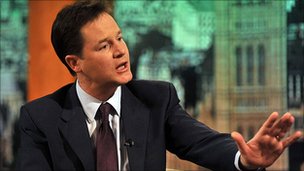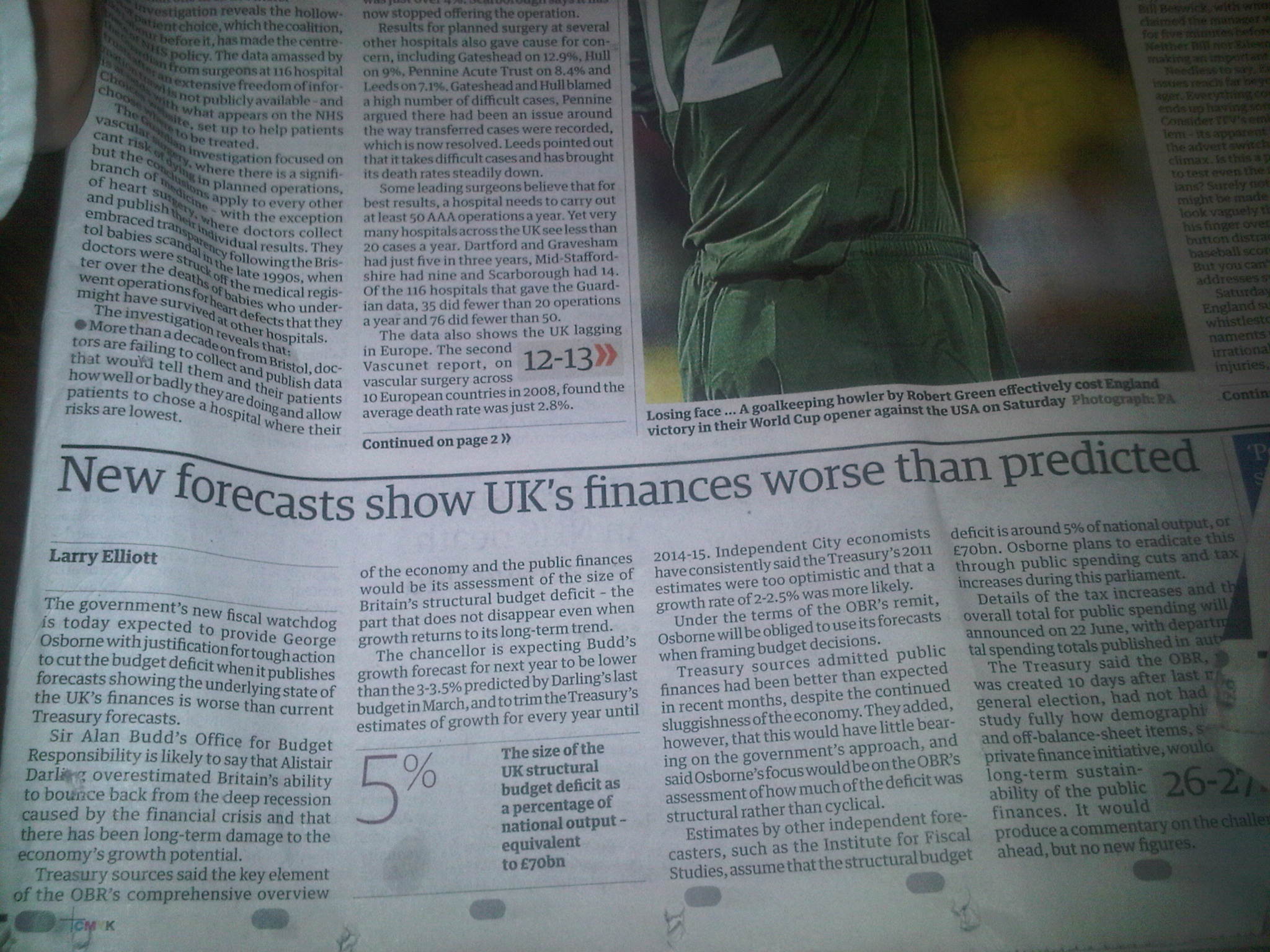4th February, 2011
Nick Clegg, speaking on Radio 4’s Today Programme this morning, came out fighting with a “new model” for economic growth.
Or, if not yet a new model, it will be, when they’ve come up with it. It seems coming up with a plan “is not an overnight job” and “you can’t just put Humpty Dumpty back together again”.
The economy, he argued, needs rebalancing. It has been overly focussed on financial services. It has been fuelled by indebtedness. We’ve had growth “on the never-never”. It is unsustainable.
I don’t think anyone could argue that it wouldn’t be nice to have more industry and less reliance on services in our economy. Unfortunately we were deindustrialised by the Tories… but if there’s a way to get manufacturing going again, hurrah.
I don’t think anyone could argue that the private sector is not massively indebted; this is perhaps an unfortunate product of stability and particularly interest-rate stability. Cheap – reliably cheap – money. It’s hard not to feel jittery about that as the spectre of stagflation looms.
Trouble is, noticing that we have been over-exposed to the financial sector, or that cheap money has produced an indebted private sector, doesn’t amount to a plan for growth.
Mr Clegg suggests there are four elements to such a plan:
1) to wean the economy off debt-financed growth
2) to invest in infrastructure, skills and education
3) to boost competitiveness by reducing regulation and tax
4) to balance growth across regions and sectors
On 1) (weaning the economy off debt-financed growth) it is hard to square this idea with the constant calls for the banks to lend more to business. Perhaps consumers are also borrowing too much, with cheap money fuelling a housing boom. But mortgages are now very hard to get and the housing market is in dire straits. Whichever way you look at it, debt-fuelled over-consumption seems to be the least of our problems.
On 2) (investing in infrastructure, skills and education) it is hard to see this government investing in anything. School rebuilding has been abandoned. Crossrail survived by the skin of its teeth, as did the high speed rail plans. What new infrastructure might we expect? Don’t hold your breath, dear reader. As for “skills and education” the intentions of the Tory-led government are very clear. They’ve completely withdrawn funding for whole swathes of higher education.
On 3) (reducing regulation and tax) these sound good. Who likes regulation and tax? But what does this really mean? Are we going to reduce regulation of the banks? I doubt it. Regulation is there for a reason.
Are we going to reduce tax? It doesn’t look like we can afford to. Taxes, in fact, are going up. Personally I don’t worry about that, because I don’t think slackening the tax regime helps growth. Investment is driven by the desire for profit. Spotting the chance to make a buck. And that needs a vibrant economy – people with money in their pockets, willing to spend. Sure tax plays a part in determining costs and profit, but if nobody has any money to buy my ice cream, you can cut my taxes all you like, I still have no sales, no profit, no tax. Costs matter, but demand matters more. And demand comes first.
On 4) rebalancing the economy, oh, go on then. Let’s have some industry and not just a service economy. And let the north thrive. Might be a good idea to fund some regional development agencies to make that happen. Oh no – we already have those. Created in 1998. Abolished on 22 June 2010. Closing soon.
The Tory-led government believes in the ‘crowding-out argument’ which I have discussed elsewhere in this blog. When demand drops out of the economy, those who believe in the “crowding out” credo jump into action. They cut demand even more, by slashing government spending and throwing people onto the dole. Nick Clegg says, “we can’t just put Humpty Dumpty together again” as if that justified what they are doing to Humpty – namely to kick seven shades of shit out of him.
The truth is I’m being mischievous when I scrutinize Clegg’s “plan”. And so is Labour and everyone else who asks the government “where’s your plan for growth?” Because we all know that the credo cannot allow alternatives. The deficit reduction drive IS the plan for growth. The dismantling of the state IS the plan for growth. The stepping-back of government in order for the private sector to “do its thing” (or not) IS the plan for growth.
There’s no Plan B for Humpty. We all know that. Would somebody please tell Nick Clegg?


 complaint online about Newsnight’s poor production values, and Paxman’s chairmanship of the Labour leaders’ debate. Ed Balls was surprisingly winning. Andy Burnham was cruelly described online as looking like a Thunderbird puppet (Troy!). Diane is Diane, and if you like her, you’ll still like her after that performance – but if you don’t, you’ll be feeling unmoved. Ed M looked like somebody’s younger brother, and I know how that feels. David Miliband is the next leader, that is very clear. At one point he spoke, quite effortlessly, on behalf of the whole panel. He’s just got it.
complaint online about Newsnight’s poor production values, and Paxman’s chairmanship of the Labour leaders’ debate. Ed Balls was surprisingly winning. Andy Burnham was cruelly described online as looking like a Thunderbird puppet (Troy!). Diane is Diane, and if you like her, you’ll still like her after that performance – but if you don’t, you’ll be feeling unmoved. Ed M looked like somebody’s younger brother, and I know how that feels. David Miliband is the next leader, that is very clear. At one point he spoke, quite effortlessly, on behalf of the whole panel. He’s just got it.